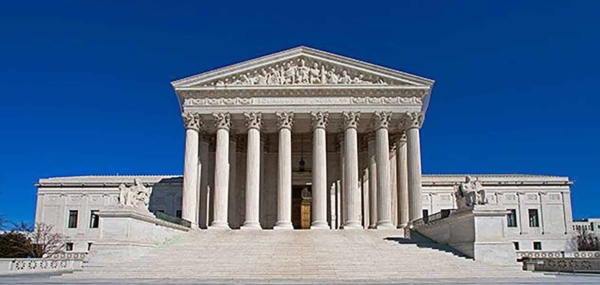Most of the court-ordered plan that includes Special Master’s districts to remain in place
WASHINGTON, D.C. – The U.S. Supreme Court issued a per curiam decision today, largely affirming a lower court’s ruling in North Carolina v. Covington and upholding most of the court-ordered map with some districts redrawn by a Special Master. The court requested recommendations from a Special Master after plaintiffs successfully challenged the redistricting plan enacted by the state legislature in 2017 on the grounds that racially discriminatory districts still persisted. The U.S. Supreme Court upheld those districts but held that the lower court did not need to determine whether other districts complied with the state constitution.
“Thanks to the dedication of the plaintiffs in this case, voters in North Carolina will finally be able to vote in state legislative districts drawn without unconstitutional racial discrimination,” Allison Riggs, Senior Voting Rights Attorney for the Southern Coalition for Social Justice, who represents plaintiffs in the case. “The order from the Supreme Court today sends the message loud and clear that discrimination, even if hidden under a self-proclaimed veil of ignorance, will not be tolerated in the redistricting process. We’re glad to see the district court’s careful, well-documented findings on this front affirmed.”
Prior to the U.S. Supreme Court ruling, a three-judge panel for the United States District Court for the Middle District of North Carolina found that the 2011 redistricting plan contained 28 racial gerrymanders among its state House and Senate districts.
After plaintiffs raised concerns about the remedy redistricting plan enacted by the state legislature in 2017, the three-judge panel appointed an expert Special Master to alter nine state legislative districts the Court identified that failed to adequately remedy the racial discrimination or otherwise violated the state constitution. The Special Master’s recommendations were incorporated into the state redistricting plan ordered to be enacted by the three-judge panel.
On February 6, 2018, the U.S. Supreme Court refused to block the district court’s order. However, the Supreme Court did stay revisions to a small number of districts that violate the state constitution, however. The districts redrawn by the Special Master to correct racial gerrymandering concerns are in effect for the 2018 state legislative elections.
“While it’s unfortunate that this process has dragged on for almost the entirety of the decade–to the great detriment of voters in this state–we’re gratified to be vindicated once again,” stated Allison Riggs. “We’re certain the state courts will correct the state constitutional violations before the 2020 elections, as we already have the trial court in NAACP v. Lewis finding that we are likely to succeed on the merits, but importantly, we have finally achieved our clients’ goals for this litigation: to eradicate the blatantly unconstitutional sorting of voters by race in North Carolina’s state legislative districts.”
The Southern Coalition for Social Justice, along with the Poyner Spruill law firm, represents the plaintiffs in the lawsuit.
Background about this case:
On June 5, 2017, the U.S. Supreme Court summarily affirmed a lower court’s decision in Covington v. North Carolina that 28 of North Carolina’s state legislative districts are racial gerrymanders. The decision was issued “per curiam,” meaning by a unanimous decision of the Court. The ruling came two weeks after the U.S. Supreme Court found two of the state’s congressional districts were also racial gerrymanders.
On July 31, 2017, North Carolina’s Middle District Court ordered the North Carolina General Assembly to redraw legislative maps by September 1, 2017, in order to remedy the unconstitutional racial gerrymanders. The legislature adopted new maps on August 30, 2017.
Plaintiffs filed objections to the newly drawn district plans and a hearing was held in front of a three-judge panel in the Middle District of North Carolina on October 12, 2017.
On October 26, 2017, the federal panel announced its intention to appoint Dr. Nathaniel Persily to the position of “Special Master” to review the newly adopted redistricting plan and make recommendations to ensure compliance with state and federal law in a few areas of the map where the Court believed the remedial plan was inadequate or otherwise illegal. Dr. Persily’s appointment became official on November 1, 2017.
Dr. Persily issued draft recommended changes to the state’s redistricting plan on November 13, 2017, and solicited feedback from the plaintiffs and defendants. Both submitted comments.
Meeting the deadline set by the three-judge panel, Dr. Persily submitted his final set of recommendations to the district court on December 1, 2017.
The three-judge panel heard arguments from the plaintiffs and defendants regarding the Special Master’s plan on January 5, 2018.
On January 19, 2018, the three-judge panel ordered that the Special Master’s recommendations be incorporated into the state’s state legislative redistricting plan.
On February 6, 2018, the U.S. Supreme Court refused to block the district court’s order. However, the Supreme Court did stay revisions to a small number of districts that violate the state constitution, however.
###

